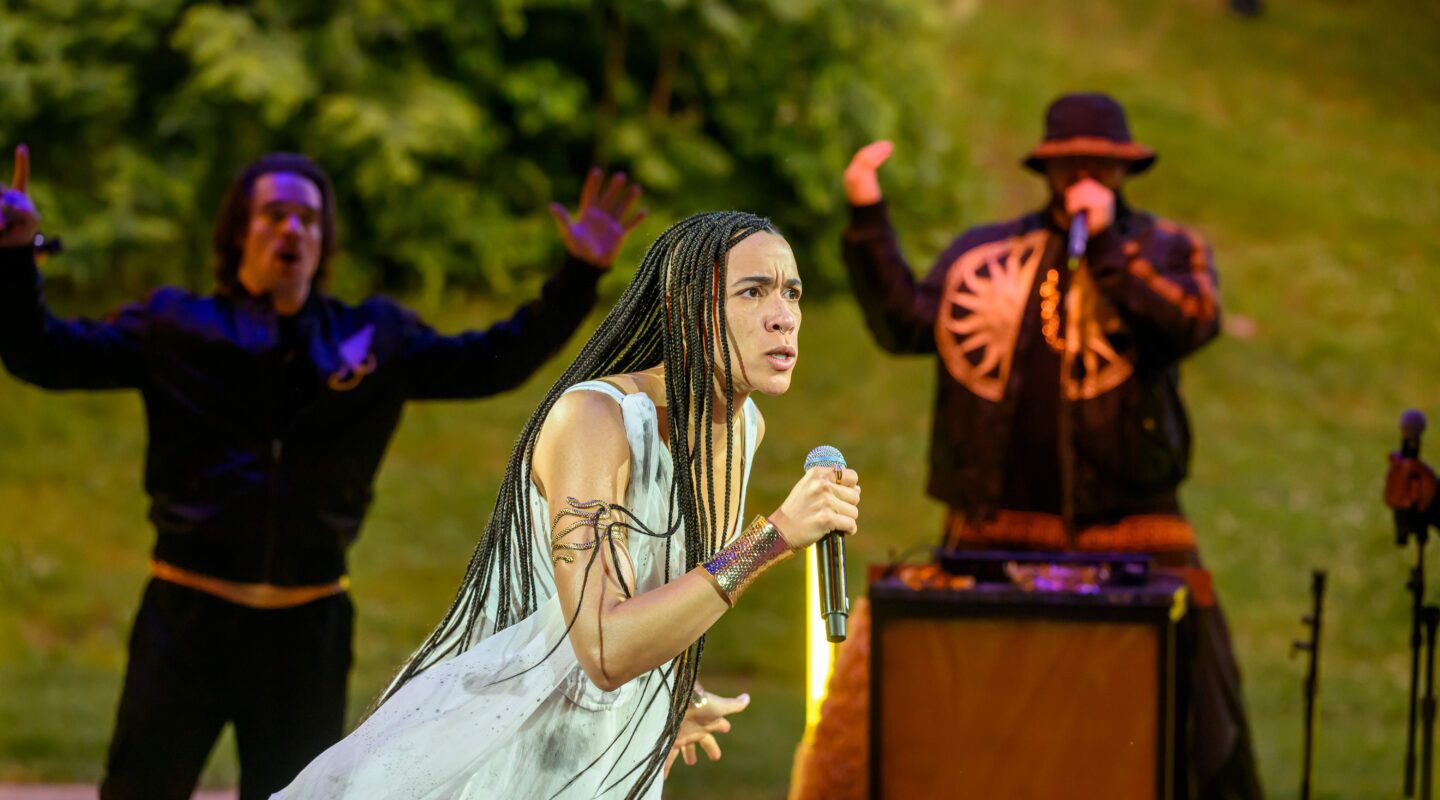Posted August 8, 2024
For the first time, the Hudson Valley Shakespeare isn’t presenting a complete work by its namesake. But a hip-hop adaptation of ‘Medea’ shines
By
GARRISON — Davis McCallum, director of the Hudson Valley Shakespeare, took a big risk this year: For the first time in its 37-year history, the festival will not present one of its namesake’s complete plays.
However, McCallum is bullish on the three new original works he selected, two of which are world premieres produced or co-produced in-house.
“What propels and distinguishes these shows is the language and the acting, just like Shakespeare,” he said. “We’re not dependent on sets or theatrics — it all boils down to the basics.”
“By the Queen,” written by Whitney White, a Tony Award nominee this year for directing “Jaja’s African Hair Braiding,” delivers more than a dab of Shakespeare by mashing up hefty portions of his so-called historic plays, “Richard III” and “Henry VI.” White also devised new dialogue to tell the imagined story of Queen Margaret, one of few characters to appear in multiple Shakespeare works. The play premiered in Providence, R.I. last year.
The festival is also the sole producer of “The Murder of Roger Ackroyd,” Heidi Armbruster’s adaptation of Agatha Christie’s 1926 novella.
But McCallum’s greatest gamble, which could also deliver the largest payoff, is the “hip-hopera” “Medea: Re-Versed,” written by 30-year-old Luis Quintero, a member of the festival’s acting troupe. On Sept. 12, shortly after the run in Garrison ends, this recasting of Euripides’ 2,500-year-old Greek tragedy will open in previews off-Broadway at the Sheen Center. Produced by the festival, Red Bull Theater and Bedlam, and directed by Nathan Winkelstein, the play premiered last month and sprayed the audience with a rapid-fire hose of prose.
“Luis is a generational talent,” McCallum said. “The script has a multilayered brilliance that reminds me of ‘Hamilton.’ I’ve seen ‘Medea: Re-Versed’ a dozen times and I still discover new layers of cleverness and playfulness in the poetry.”
Not all the rhymes chime and sometimes the same two words are used to pull it off, yet the creativity of Quintero’s downhill wordplay and storytelling is undeniable. Crackling dramatic performances, balanced by lighthearted comedic interludes, provide new insight into the psyche and symbolism of Medea, the tortured female soul of Greek mythology, who eventually executes her two children and, in this telling, takes her destruction even further.
The line, “I speak for the forsaken, for women taken, for all the foreigners mistaken,” is as political as the story gets. This Medea is no feminist freedom fighter — she’s all the rage.
“Despite the odds, it seems my eyes were fated, to see you annihilated, and I elated,” the demi-goddess tells Jason, her ex-husband. “There’s a diety’s entity in my identity, anybody not a friend is an enemy.”
It’s dark, but Quintero likens his interpretation to horror films and spent time researching mothers who murdered their children, which colored his outlook.
“I’m exploring the underbelly of the beast within us, like Hitchcock or ‘Rosemary’s Baby,’ which is immediately engaging and full of tension,” he said. “Going into darkness can be a safe place; others open the door and see monsters. Beware of this Medea.”
Using battle rap to interpret an ancient Greek play might seem radical, but this approach shares similarities with what they did back in the day.
Last year, Tanya Pollard, a Shakespeare specialist at Brooklyn College, brought her teenage daughter to a staged reading.
“At one point, we looked at each other and our jaws dropped,” she said. “The play’s emphasis on rhythm and its steady driving beat feels true to Greek tragedy’s roots in ritualized music and dance.”
The show’s demanding lines are rapped, spoken and talk-sung to provide contrast and relief from potential ear fatigue. Quintero also kicked out a 200-page score for electric guitar, electric bass and a beatboxer (Mark Martin), who mixes parts on the fly.
At first, the music enhances the menacing mood, then shifts into ominous rap-metal fusion as Medea mulls her fatal, fateful decision. Spartan guitar riffs by Siena D’Addario intertwine with Melissa Mahoney’s funky, minimalist bass lines.
On stage, cast members move like gazelles, join in on haunting harmonies and help audiences navigate an onslaught of verse, sly jokes and what Pollard called “scholarly” references to ancient Greek mythology. Every steely gaze, hip grind and hand gesture is intentional.
As chorus leader, Quintero implores Medea to reconsider her drastic decision, but she dismisses his pleas, diminishing sympathy toward the character. Played by Sarin Monae West, Medea’s entrance is marked by a blood-curdling primal scream from the depths of hell as she rants about committing suicide.
Her fury grows as the play unfolds. Monea West prowls the stage like a panther that might self-immolate or explode like a bomb at any time: “After chewing up the scenery, I’m left to eat my words,” she says as a ploy during negotiations with Jason.
The other actors match this level of incendiary intensity. As Medea’s husband Jason, Stephen Michael Spencer seesaws between comic relief during his argument with Medea and frothing rage when he learns his children are dead. The simple line, “Hey babe, it’s me, it’s your babes’ pops,” elicits laughs.
Jacob Ming Trent’s take on Creon, the King of Corinth, evokes Martin Luther King as he thunders and threatens to exile Medea. His turn as King Ageus of Athens, who has trouble procreating and seeks Medea’s help, is an homage to the old sitcom character Fred Sanford, he said.
During the final act of filicide at a recent performance, one woman in the second row held a hand up to her collar in shock, eyes bulging with terror.
“Tonight, we had an audience in the hundreds,” said McCallum during the opening night toast. ”In a few years, thousands of people are going to say they were here because it’s only a matter of time before Luis’s name is well-known.”

